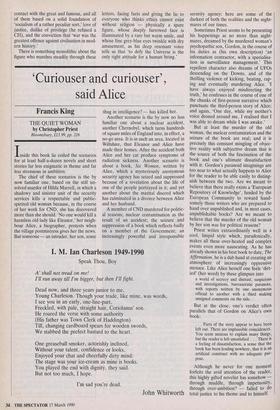`Curiouser and curiouser', said Alice
Francis King
THE QUIET WOMAN by Christopher Priest
Bloomsbury, £13.99, pp. 216
Inside this book lie coiled the scenarios for at least half-a-dozen novels and short stories far less enigmatic in theme and far less strenuous in ambition.
The chief of these scenarios is the by now familiar one, based on the still un- solved murder of Hilda Murrell, in which a shadowy and sinister unit of the security services kills a respectable and public- spirited old woman because, in the course of her work for CND, she has discovered more than she should. 'No one would kill a harmless old lady like Eleanor,' her neigh- bour Alice, a biographer, protests when the village postmistress gives her the news. But someone — an intruder, her son, some thug in intelligence? — has killed her.
Another scenario is the by now no less familiar one about a nuclear accident, another Chernobyl, which turns hundreds of square miles of England into, in effect, a no-go area. It is in such an area, located in Wiltshire, that Eleanor and Alice have made their homes. After the accident both Alice and her cat produce symptoms of radiation sickness. Another scenario is about a book, Six Women, written by Alice, which a mysteriously anonymous security agency has seized and suppressed because of a revelation about the life of one of the people portrayed in it; and yet another about the marital discord which has culminated in a divorce between Alice and her husband.
A member of CND murdered for politic- al reasons; nuclear contamination as the result of an accident; the seizure and suppression of a book which reflects badly on a member of the Government; an increasingly powerful and irresponsible security agency: here are some of the darkest of both the realities and the night- mares of our times.
Sometimes Priest seems to be presenting his happenings as no more than night- mares, dreamed by the murdered woman's psychopathic son, Gordon, in the course of his duties as (his own description) 'an information contractor, with a specialisa- tion in surveillance management.' This repellent character also dreams of UFOs descending on the Downs, and of the thrilling violence of kicking, beating, rap- ing and eventually murdering Alice. 'I have always enjoyed misdirecting the truth,' he confesses in the course of one of the chunks of first-person narrative which punctuate the third-person story of Alice; and again, 'One day, while my mother's voice droned around me, I realised that I was able to dream while I was awake.'
But at least the murder of the old woman, the nuclear contamination and the seizure of the book are real; and it is precisely this constant mingling of objec- tive reality with subjective dream that is the source of both the fascination of the book and one's ultimate dissatisfaction with it. Gordon's paranoid imaginings are too near to what actually happens to Alice for the reader to be able easily to disting- uish between the two. Are we meant to believe that there really exists a 'European Repository of Knowledge', funded by the European Community to reward hand- somely those writers who are prepared to hand over unpublished and, in most cases, unpublishable books? Are we meant to believe that the murder of the old woman by her son was for political reasons?
Priest writes extraordinarily well in a cool, limpid style which, paradoxically, makes all these over-heated and complex events even more nauseating. As he has already shown in his best book to date, The Affirmation, he is a dab hand at creating an atmosphere of increasingly oppressive menace. Like Alice herself one feels 'dirt- ied' (her word) by these glimpses into
a world of secrecy and distrust, suspicions and investigations, bureaucratic paranoia, with reports written by one anonymous official to another with a third making unsigned comments on the side.
But at the close, one's verdict often parallels that of Gordon on Alice's own book: . . . Parts of the story appear to have been left out. There are implausible coincidences. You seem anxious to explain many things, but the reader is left unsatisfied . . . There is a feeling of dissatisfaction, a sense that the book has been leading nowhere, that it is an artificial construct with no adequate pur- pose.
Although he never for one moment forfeits the avid attention of the reader, this highly gifted novelist has somehow through muddle, through impetuosity, through over-ambition? — failed to do total justice to his theme and to himself.


























































 Previous page
Previous page